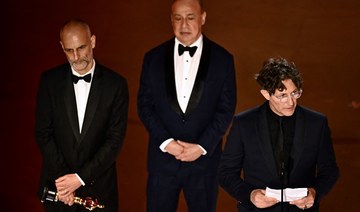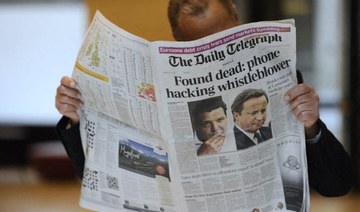DUBAI: Several Jewish organizations have defended filmmaker Jonathan Glazer for his criticism of Israel’s war on Gaza, as the director faced a backlash for his comments.
Glazer, whose movie “The Zone of Interest” won this year’s Oscar for best international feature, had said in his acceptance speech last week that the film showed “where dehumanization leads at its worst.”
He added: “We stand here as men who refute their Jewishness and the Holocaust being hijacked by an occupation which has led to conflict for so many innocent people. Whether the victims of October the 7th in Israel or the ongoing attack on Gaza, all the victims of this dehumanization, how do we resist?”
The speech made waves, prompting more than 450 Jewish creatives, executives, and Hollywood professionals, including actress Debra Messing and director Eli Roth, to denounce the Jewish director in an open letter shared by Variety on March 18.
Since then the number of signatories has risen to over 1,000, according to Variety.
The letter stated: “We refute our Jewishness being hijacked for the purpose of drawing a moral equivalence between a Nazi regime that sought to exterminate a race of people, and an Israeli nation that seeks to avert its own extermination.”
While highlighting that “every civilian death in Gaza is tragic,” the signatories defended Israel’s conduct in Gaza as “targeting Hamas.”
Now other Jewish individuals and organizations are defending Glazer, drawing attention to the rift the war has created within the Jewish community.
Piotr Cywinski, director of the Auschwitz Memorial, said on March 14: “In his Oscar acceptance speech, Jonathan Glazer issued a universal moral warning against dehumanization. His aim was not to descend to the level of political discourse.”
"In his Oscar acceptance speech, Jonathan Glazer issued a universal moral warning against dehumanization. His aim was not to descend to the level of political discourse.
Critics who expected a clear political stance or a film solely about genocide did not grasp the depth of his… pic.twitter.com/222Xv3lVEb
— Auschwitz Memorial (@AuschwitzMuseum) March 14, 2024
Jewish Voice for Peace said in a statement on Tuesday that Glazer “speaks for the massive and growing number of Jews who honor our histories by joining our Palestinian siblings in their struggle for freedom and justice.”
The organization describes itself as “Jews organizing toward Palestinian liberation and Judaism beyond Zionism,” and backs the boycott of Israeli goods.
It added: “And as anti-Zionist Jews, we will continue to stand with them in struggle until Palestine is free.”
In reality, Glazer speaks for the massive and growing number of Jews who honor our histories by joining our Palestinian siblings in their struggle for freedom and justice. And as anti-Zionist Jews, we will continue to stand with them in struggle until Palestine is free.
— Jewish Voice for Peace (@jvplive) March 19, 2024
Simone Zimmerman, co-founder of IfNotNow, a community of American Jews calling for the US to end support for Israel, said on X on March 12: “The hysterics and lies about Jonathan Glazer’s honest, humane, and brave Oscar speech simply reaffirms his point — that Zone of Interest was made to ‘confront us in the present — not to say, ‘Look what they did then,’ rather, ‘Look what we do now.’”
The hysterics and lies about Jonathan Glazer’s honest, humane, and brave Oscar speech simply reaffirms his point - that Zone of Interest was made to “confront us in the present — not to say, “Look what they did then,” rather, “Look what we do now.”
— Simone Zimmerman (@simonerzim) March 11, 2024
Produced by filmmakers in the UK and Poland, “The Zone of Interest” is a historical drama that explores the horrors of the Holocaust through the life of the Auschwitz commandant Rudolf Hoss, who lived with his wife in a home close to the Nazi concentration camp.
On Oct. 7, Hamas carried out a surprise attack in southern Israel, killing 1,200 people and taking 240 others hostage, according to Tel Aviv’s figures. In retaliation, Israel launched a relentless bombing campaign across the Gaza Strip, killing more than 31,000 Palestinians, of whom at least 12,300 are children, according to Gaza’s health authority.
Israel’s ongoing offensive in Gaza has been condemned globally by humanitarian and rights organizations, including Amnesty International and UN agencies, as well as several governments.

























